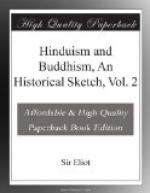Marie Alacoque, Saint Gertrude and the more distinguished
Saint Theresa. “To be loved by God and loved
by him to distraction (jusqu’a la folie), Margaret
melted away with love at the thought of such a thing....
She said to God, ’Hold back, my God, these torrents
which overwhelm me or else enlarge my capacity for
their reception’."[390] These are not the words
of the Gita-govinda or the Prem Sagar, as might be
supposed, but of a Catholic Bishop describing the
transports of Sister Marguerite Marie, and they illustrate
the temper of Krishna’s worshippers. But
the verses of the Marathi poet, Tukaram, who lived
about 1600 A.D. and sang the praises of Krishna, rise
above this sentimentality though he uses the language
of love. In a letter to Sivaji, who desired to
see him, he wrote, “As a chaste wife longs only
to see her lord, such am I to Vitthala.[391] All the
world is to me Vitthala and nothing else: thee
also I behold in him.” He also wrote elsewhere,
“he that taketh the unprotected to his heart
and doeth to a servant the same kindness as to his
own children, is assuredly the image of God.”
More recently Ramakrishna, whose sayings breathe a
wide intelligence as well as a wide charity, has given
this religion of love an expression which, if somewhat
too sexual to be perfectly in accordance with western
taste, is nearly related to emotional Christianity.
“A true lover sees his god as his nearest and
dearest relative” he writes, “just as the
shepherd women of Vrindavana saw in Krishna not the
Lord of the Universe but their own beloved....
The knowledge of God may be likened to a man, while
the love of God is like a woman. Knowledge has
entry only up to the outer rooms of God, and no one
can enter into the inner mysteries of God save a lover....
Knowledge and love of God are ultimately one and the
same. There is no difference between pure knowledge
and pure love."[392]
These extracts show how Krishna as the object of the
soul’s desire assumes the place of the Supreme
Being or God. But this surprising transformation[393]
is not specially connected with the pastoral and erotic
Krishna: the best known and most thorough-going
exposition of his divinity is found in the Bhagavad-gita,
which represents him as being in his human aspect,
a warrior and the charioteer of Arjuna. Probably
some seventy-five millions to-day worship Krishna,
especially under the name of Hari, as God in the pantheistic
sense and naturally the more his identity with the
supreme spirit is emphasized, the dimmer grow the
legendary features which mark the hero of Muttra and
Dvaraka, and the human element in him is reduced to
this very important point that the tie uniting him
to his worshippers is one of sentiment and affection.




